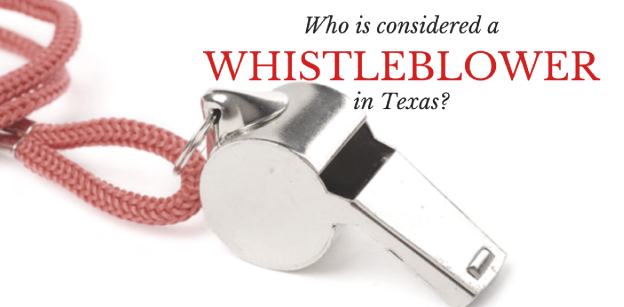With Texas being an at-will employment state, there are limited legal protections for employees. At-will employment essentially means that an employee can be fired for any reason (good or bad) or no reason, so long as the employee is not fired for a reason that violates a state or federal statute. One state statute that provides certain protections to public employees in Texas is the Texas Whistleblower Act, Chapter 554 of the Texas Government Code.
The Texas Whistleblower Act only applies to employees of state and local governmental entities in Texas. The Act specifically protects a public employee who has reported in good faith what he/she believes to be a violation of federal or state law, a local government ordinance, or a rule adopted under a law or an ordinance. Generally, it does not provide protections for reporting violations of an agency’s employee handbook or personnel policies.
What is considered protected activity?
To be considered protected activity, the violation of federal or state law must be made to an “appropriate law enforcement authority.” This is where the Act gets a little bit more complicated and limited in its application in the real world. An appropriate law enforcement authority is defined as “a part of a state or local governmental entity or of the federal government that the employee in good faith believes is authorized to:
- Regulate under or enforce the law alleged to be violated in the report
- Investigate or prosecute a violation of criminal law.
So what does that mean in Layman’s terms? Unfortunately, because of the current state of the law, it is not always clear what that means. In some situations, the appropriate law enforcement authority may be the Texas Attorney General’s Office. In others, it could be the United States Department of Justice. It could also be a report made to the particular state agency that is tasked with regulating or investigating violations of the law in question.
So am I protected if I make a report to my supervisor or human resources?
One of the biggest issues with the Texas Whistleblower Act is what happens when an employee reports a violation of state or federal law to his/her supervisor or HR. Generally, an employee’s report to his/her supervisor or HR is not going to be considered a report to an appropriate law enforcement authority. The unfortunate reality is that a significant number of employees who experience retaliation have only reported a violation of law internally. Under the Texas Whistleblower Act, these types of reports likely provide no protection to the employee.
Finally, in order for there to be a retaliation claim:
- The employee who reports the violation of law must have been suspended, terminated, or otherwise adversely affected by a personnel action for having reported the violation.
- If the public employee is suspended, terminated, or adversely affected, he or she must first file a grievance or appeal with the employer within 90 days of the violation (if the employer has a grievance policy or appeal procedure).
- If the grievance does not resolve the employee’s complaint, the public employee must file a lawsuit within 90 days of the violation (not including the time spent in the employer’s grievance/appeal procedure).
As with any potential legal claim, it is always important to speak with an employment attorney if you believe that you may have been retaliated against for reporting a violation of law. Due to the small window of time that one has to pursue a whistleblower claim in Texas, as well as the complexities of the law, an attorney can help ensure that your rights are protected. 








